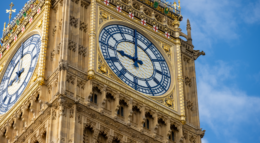
John Baron MP: Britain must learn lessons from its response to Ukraine
Britain's response to the war in Ukraine shows it needs to reassess its hard and soft power strategies, particularly regarding defence spending and British Council funding, writes John Baron.
Even if one was being charitable and suggested the Russian invasion was adhering to the Clausewitz stratagem of the feint (Kyiv), the fix (East Ukraine) and the decisive strike (the Black Sea coast), things have not gone to plan. Russian forces have met stiff opposition from the Ukrainian Armed Forces and people alike – who have fought and resisted like lions. Western sanctions have been deeper, harsher and far more united than the Russian leadership expected, and its economy is suffering accordingly.
But whatever the outcome on the ground, the world has changed. We have entered a near era in the worldwide battle for democracy, which will require meaningful and sustained investment in our hard and soft power capabilities if we are to prevail. Let us hope governments are up to the mark, including our own.
Britain has certainly done well in this first phase of the conflict. As well as strong diplomatic support and extensive military training under Operation Orbital, it was providing anti-tank and other equipment even before the Russian invasion. It is clear that this anti-armour weaponry has been decisive in the fighting over the last few weeks, preventing the Russians from moving their columns with impunity and, in particular, targeting the all-important supply lines. As the conflict develops, it is essential that Ukraine's western allies keep topping up the Ukrainian arsenal. British and Western intelligence services have also greatly assisted the Ukrainian efforts.
The British Government is also right to advise the Ukrainian Government, and other friendly governments, to be circumspect when it comes to the peace negotiations with the Russians. Whilst it is right that any agreement will be harder the more lives that are lost, it is also important to bear in mind that the Ukrainian Armed Forces are far from beaten on the battlefield and they are therefore not supplicants when it comes to these negotiations. The Russians are also in trouble and are up to their necks in their own mess. They need the fighting to stop too.
However, although early days, Britain's own response to the Russian invasion of Ukraine has been disappointing. The best way of securing peace is through strength. Yet the Chancellor's Spring Statement did not give any indications of an increase in defence spending. There is a wide understanding, which the Foreign Secretary confirmed to me during her recent statement in Parliament, that the West has underspent on defence in recent decades. It is time this is addressed, but this increase in spending must be based on need and capability, and not based on a percentage of GDP and it must be sustained over the long term. This must include an understanding that the assumptions underpinning the Integrated Review no longer quite hold true.
The document does not require wholesale re-writing, but it would surely be sensible to pause the disposal of equipment and the shedding of further defence manpower – especially as regards the Army and its armoured units – until a reassessment is made as to whether these plans are still appropriate. No-one doubts that drones and cyber are now essential components of modern warfare, as Ukraine has shown, but Ukraine has also shown the value of well-trained, motivated and highly-mobile soldiers. The NLAWs and Javelins have not fired themselves, and it is encouraging that the Royal Marines are studying the conflict with a view to updating their tactics.
We need to be more strategic in our thinking. Our interventions in the Middle East, North Africa and Afghanistan may well have distracted us from the greater danger of hostile nation states, and certainly reconfigured our forces. We also need to better understand that larger armed forces not only help to protect the peace, but also bring many other benefits when it comes to defence diplomacy, domestic strategic industries and even the Union. As ever, spending needs to be prioritised accordingly – as someone opposed to HS2, and having long advocated streamlining of the many quangos, many billions of pounds could be found to help fund this increase in spending.
The other disappointing strand in our response to the Russian invasion is the Government's failure to follow through on its rhetoric on soft power. In the Commons the Foreign Secretary also said how much she valued soft power and that the UK was expanding its soft power capabilities. Whilst it is true that the Government has commendably provided emergency funding to support the BBC World Service Russian and Ukrainian services, it is also poised to cut the British Council's budget still further, which may require the closure of another 20 overseas offices – on top of the 20 that resulted from last year's failure to compensate the British Council for its loss in commercial revenue during the pandemic.
Since the ending of the Cold War and the collapse of the Soviet Union, the British Government, and other Western governments, have for too long made the lazy assumption that the victory of liberal democracy was complete – the end of history. Yet as we are increasingly seeing across the world with the rise of authoritarianism, this concept is in truth a fragile one. The flame of democracy needs to be constantly fed and nurtured, which is why a government decision to cut the budget of the British Council, which spreads and advocates our values worldwide, is so baffling and incoherent.
Competitors such as China are expanding their soft power networks, and it makes no sense that we may be about to cause further damage to one of our primary soft power tools at a time when projecting our values and building links with people in other countries is more important than ever. The British Council All-Party Parliamentary Group continues to campaign against closures. There is no doubt the Government needs to step up to the mark.

John Baron is the former Conservative MP for Basildon and Billericay and a former Shadow Health Minister.











